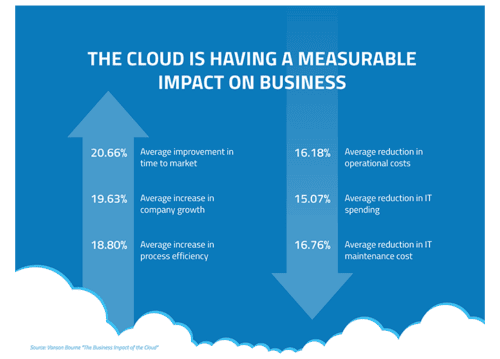If you’re a business owner, you are probably already outsourcing parts of your business. Indeed, the eight most outsourced functions are, customer support, data entry, HR, IT support, payroll and accounting, PR and marketing, transcription and virtual assistant. “Outsourcing” is not a bad word or thing, rather it presents business opportunities and solutions which may ultimately make the difference between success and failure in today’s ever-changing data driven economy. This is especially true for small-to-midsized companies’ that can leverage outsourced resources, especially IT, to level the playing field with the “big boys” and obtain a competitive advantage.
Why Do Companies Outsource IT?
According to Deloitte’s 2016 Global Outsourcing Survey, cost, enabling core business, and solving capacity issues are the primary drivers of an organization’s decision to outsource a particular function. Companies’ have many reasons to outsource, although the reduction and control of operational expenses is the most common. Many businesses also outsource operational functions to gain access to intellectual capital and skills which they do not possess enabling them to concentrate on and invest more in their core competencies.
As Deloitte notes, the following are the most common reasons for companies to outsource:
- 59% – Reduce or control costs
- 57% – Focus on core functions
- 47% – Solve capacity issues
- 31% – Improve service
- 28% – Gain access to expert talent and knowledge
- 28% – Critical to business needs
- 17% – Manage business environment
- 17% – Accelerate organizational transformation
This “clarity of focus on core functions” is particularly important for small-to midsized businesses, which typically do not have the resources to bring all necessary non-core skillsets in-house or build the IT infrastructure required to effectively compete and remain in operation. Outsourcing these requirements allows these companies to focus on what they do best and delegate non-core functions to subject matter experts. Nowhere is this more evident than in the information technology space. Rather than build and maintain data centers and hire, assemble and retain a multi-discipline IT department, companies can outsource these functions and realize significant cost-savings while having access to the advantages of the latest technology designed, built and managed by highly skilled IT professionals.
Concerns About Outsourcing Some or All of Your IT Requirements
Companies rarely hesitate to outsource the drafting of complex legal documents to outside counsel or the preparation of tax returns to an accounting firm. But there is frequently trepidation and anxiety involved in the decision to outsource IT functions. This is not surprising since a disruption in IT services can cripple an organization’s ability to function. Couple this with concerns over data security and data integrity, and it is easy to see why, despite the compelling benefits of IT outsourcing discussed below, companies are reluctant to outsource their IT requirements. Deloitte notes in its 2018 Global Outsourcing Survey that the top five concerns with cloud services are:
- Data Security: 68%
- Performance and Resilience: 45%
- Compliance with Laws & Regulations: 39%
- Loss of Intellectual Property: 39%
- Ability to Terminate without Excessive Penalities: 35%
Data Security
Whether your data resides on premise or in the cloud, it may be at risk. The root causes of a data breach in the US are: Malicious or Criminal attack 52%; System Glitches, including both IT and business process failures, 23%, and Human Error 25%, Ponemon Institute’s 2018 Cost of a Data Breach Study*. Placing workloads in the cloud does not require a security trade-off, rather the opposite is true. According to Gartner, enterprises actually benefit from the security built into the cloud. In nearly all data breach cases, it is the user — not the cloud provider — who fails to manage the controls used to protect an organizations data. Gartner further opines that:
- Through 2020, public cloud infrastructure as a service (IaaS) workloads will suffer at least 60% fewer security incidents than those in traditional data centers;
- Through 2022, at least 95% of cloud security failures will be the customer’s fault; and,
- The 60% of enterprises that implement appropriate cloud visibility and control tools will experience one-third fewer security failures.
Data security is an enterprise wide responsibility. Managed properly, the cloud is a secure, highly available, cost-effective business tool. It is important that your managed service provider is well versed in securing both public and private cloud solutions. This includes but is not limited to your provider conducting industry recognized self-audits by third party auditors (i.e. SAE SOC 2, Type II) and regular security reviews in conjunction with the internal controls necessary to support these processes.
Performance and Resilience
When designed, built and managed properly, cloud performance, resilience and access is hard to beat. By utilizing geographic redundancy, enterprises are able to mitigate the risks of a localized geographic catastrophizes or events. Service Level Agreements (SLAs) often provide a 99.5% or better uptime guarantee ensuring data is highly available wherever your employees have an internet connection. And, with adequate bandwidth, latency is a non-issue. In fact, Outer Edge, in a recent ground breaking achievement, designed and built a cloud-based IaaS solution for an MES system that had never been deployed in the cloud. The MES system, among other things, handles the environmental controls in a life sciences manufacturing facility which requires strict, time sensitive environmental controls to produce innovative bioengineered therapies.
Compliance with Laws and Regulations
For regulated companies, adhering to statutory requirements is not an option. The good news is that deploying validated systems in the cloud is not an obstacle to achieving regulatory compliance. However, choosing an MSP with industry experience like Outer Edge is critical to meeting compliance requirements. From audit trails to supplying IQ data for validated systems, to storing and processing data only in the US, a qualified MSP can be an indispensable part of your quality system infrastructure.
Loss of Intellectual Property
Unless there is a data breach at your cloud provider’s data center, the loss of IP merely by using the cloud is a non-issue. As explained above, the cloud when deployed properly is more secure than on premises operations. By contract, you should deny MSP’s the ability to access your data and expressly stipulate that any data uploaded to the cloud is owned exclusively by your enterprise and that no rights are granted to the MSP or anyone else. And, if the data is encrypted both in transit and at rest, third parties will not be able to use the data unless they have an encryption key or can crack the encryption solution — an extremely unlikely scenario. Managed properly, Intellectual property is safe in the cloud.
Ability to Terminate Without Excessive Penalties
Termination clauses are a matter of contract and negotiation between the customer and its cloud services provider (CSP) or MSP. In instances where private, dedicated resources are deployed and professional services are provided as part of a particular solution and a term of years agreed to, the CSP may seek to recover some of its reliance costs as an negotiated “early termination fee” in the event the customer opts to walk early. These agreements invariably have SLA’ requirements which, if breached by the CSV, will result in credits provided to the customer. In addition, the customer may terminate the contract without penalty if the SLA is not routinely met allowing the customer to walk away from a CSP that does not perform as promised. Where the cloud deployment is on a “pay as you go” model without professional services being included like AWS or Azure, there typically are not any early termination penalties. When thoughtfully negotiated, an appropriate early termination fee protects the expectations of both parties.
Some Key Benefits of Outsourcing Some or All of Your IT Requirements
1. Control and Reduction of Costs

Outsourcing IT functions enables businesses to reduce and control costs by paying a set monthly fee. Costs do not fluctuate month to month unless the service mix is altered. Businesses are relieved of the heavy capex burden of buying, managing, configuring and replacing hardware and the costs associated with hiring, training and retaining a multi-discipline IT staff. In addition, the money needed to procure and maintain real estate to house a data center can be used to grow rather than support business operations. MSP’s offer economies of scale, lower cost structures, and learned efficiencies coupled with multi-discipline IT expertise that enables companies to lower operating reduce costs and gain a competitive IT advantage.
2. Your Business Comes First
Whether you manufacture widgets, build skyscrapers or design wind farms, these are your core competencies, not information technology. Partnering with a qualified MSP like Outer Edge will allow your business to devote additional resources and focus on your core competencies to compete more effectively thereby enhancing the bottom line.
3. Utilization of Cutting Edge Technology
MSPs like Outer Edge bring world-class knowledge and experience to bear on behalf of their clients every day giving them the edge they need to successfully compete in the global economy. From access to ever evolving new technologies and know-how that clients may not be aware exists, to techniques and tools that they currently do not possess, outsourcing to a qualified MSP allows businesses to run at peak efficiency and scale up or down quickly to adapt to ever changing market conditions.
Qualified MSPs offer the gamut of IT skillsets from network engineer to database administrator to tackle any IT situation that may arise. By contrast, in house IT departments are limited to the skill sets and expertise of its finite number of employees.
4. Customization and Compliance
There is no one-size-fits all IT solution. An important feature of private clouds is the ability to tailor solutions to unique circumstances and specific regulations. Every enterprise has different technical, business and regulatory requirements that vary according to company size, industry, and business objectives. A private cloud solution enables businesses to customize an infrastructure with specific performance, retention and networking characteristics designed to meet clearly defined industry requirements and government regulations.
5. Strategic IT Consulting and Planning for the Future
With years of experience designing solutions to meet the requirements of diverse industry clientele, as well as keeping current with the latest technology, qualified MSPs and IT consultants like Outer Edge can be an indispensable partner in guiding and advising companies with respect to options and strategies to meet their current and future IT requirements in the most cost-effective manner.
Technology is constantly changing and unless information technology is your core competency, you are at a disadvantage when it comes to deciding what the best IT solution might be for your business now and in the future. By collaborating with a qualified MSP, uncertainties are mitigated and you will have all the necessary information and expertize available to make the right IT decisions for your company.
6. 24/7/365 Monitoring of Your IT Environment
Even for companies that have the luxury of an in-house, knowledgeable, multi-discipline IT staff, it may not be reasonable to ask them to monitor your IT environment 24/7/365. Qualified MSPs like Outer Edge have the tools and resources to constantly monitor your environment and proactively address serious issues before they result in downtime. In addition, MSPs are able to advise you with respect to future upgrades to avoid downtime and security vulnerabilities. Are your servers or operating systems reaching “End of Life” or worse yet no longer supported?
MSPs will manage the day-to-day tasks such as software updates and patches, anti-virus and malware updates, and data backups to free you up to focus on what matters most — your business.
Summary
Outsourcing some or all of your IT requirements in today’s technology driven business environment offers many advantages including cost-savings, enhanced IT systems performance and security, as well as rapid scalability. To get the most out of what outsourcing your IT requirements can offer however, will require you to choose develop a close, collaborative relationship with your IT service provider can be intimidating. Fortunately, there are some ways to make this process easier.
Most important is the need for a contract that clearly specifies and defines the responsibilities and expectations both parties have for this critical business arrangement. You also need to fully define and articulate your project’s goals to ensure they align with the service provider’s capabilities and maintain channels of communication throughout your relationship. Thorough research and references are a necessity, whether you are choosing an MSP or directly hiring an employee. And, a strategic vision for your project and business is also essential for successfully outsourcing IT requirements, as is support from the stake holders in your organization.
Why Outer Edge?
Outer Edge Technology has been designing, building and managing IT solutions for over a decade. We have extensive experience in serving businesses with strict regulatory requirements, which need additional capabilities for data protection and integrity among other things. We specialize in helping small and medium-size businesses that don’t have the resources required to fully staff their own IT department and often function as an extension of our clients’ IT departments. So if you are considering outsourcing some or all of your IT requirements to the cloud, or would like to discuss other ways in which technology can benefit your business, contact us online today at info@OuterEdge.biz or call 844-OET-EDGE to learn more about how we can help you with your IT needs and give your business a competitive edge!
* Negligent insiders are individuals who cause a data breach because of their carelessness, as determined in a post data breach investigation. Malicious attacks can be caused by hackers or criminal insiders (employees, contractors or other third parties). The most common types of malicious or criminal attacks include malware infections, criminal insiders, phishing/social engineering and SQL injection. Id.







